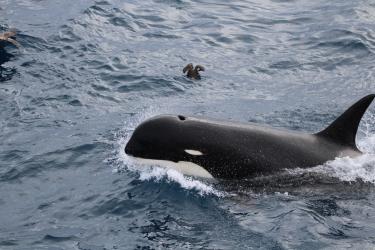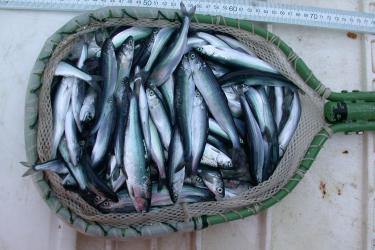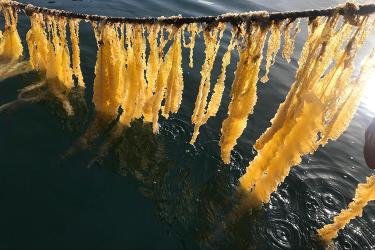A few special places on earth support a great wealth of its species: tropical coral reefs and tropical rainforests might come to mind.
Most people wouldn’t think of Alaska’s Aleutian Islands. This stark and stormy archipelago in the far north seems an unlikely contender to rival the planet’s biodiversity heavyweights—until you look beneath the surface.
Deep under the cold seas, life flourishes in an array of colors and forms. Corals and sponges create an oasis where fish, crabs, and stranger creatures shelter and forage. Bubblegum corals and bamboo corals, vase sponges and glass sponges—some 137 coral and 150 sponge species have been discovered here so far, 85 or more of them found nowhere else in the world.
Biodiversity and Biomedicine

As in tropical rainforests, the bounty of species in coral gardens may hold treasures yet to be uncovered.
“The sponges in Aleutian coral gardens have potentially great biomedical importance,” says NOAA Fisheries scientist Bob Stone, who has conducted pioneering research on coral ecosystems in Alaska for nearly 20 years. “They have incredible potential for biomedicine.”
A leading biomedical scientist recognized the potential of the region after reading a 2003 Science Magazine article about Aleutian Island explorations by Stone and his colleagues. Now Stone is working with scientists at the University of Mississippi to find novel compounds in Alaskan sponges that can be used in medicines.
Stone collects sponges from very deep waters with submarines and ROVs, and NOAA Fisheries scientists have collected specimens from annual trawl surveys in the region. “This is really exciting research,” says Stone. “Very few people get to go out there and find something that might lead to a cure for asthma or tuberculosis or cancer. We have had some very close calls so far. I am convinced we will find something earthshattering if we keep looking.”
A Hotspot for Cold Corals

This Aleutian sponge Latrunculia oparinae produces novel compounds that fight pathogens causing hepatitis C, malaria, and AIDS-related opportunistic illnesses. Photo by Bob Stone, NOAA Fisheries.
The kind of rich biodiversity in Aleutian coral gardens is found in few other places in the world--usually near the equator, in warm, bright, stable environments.
Aleutian coral gardens thrive close to the Arctic, in an environment featuring near-freezing water, nearly complete darkness, violent storms, strong seasonal changes, and frequent volcanic activity.
“The Aleutian Islands are strange—there is no other word for it. There is nothing else like them anywhere in the world,” says Stone. “They are the only portal to the poles that acts as a sieve for ocean circulation to polar seas. And they have a lot of beautiful, fresh lava rock.”
This unique situation provides three things that cold-water corals and sponges need: plenty of food, good circulation, and rocky surfaces to attach to. And, until relatively recently, this remote location provided isolation from almost all human activities.
Healthy Relationships

NOAA Fisheries biologist Bob Stone prepares to dive for sponges in the Delta submersible. Photo NOAA Fisheries.
The biodiversity of Alaskan coral gardens is a sign of their good health. The importance of healthy deep-sea coral ecosystems to fisheries around the U.S. was officially recognized in the Magnuson-Stevens Act of 2006, which calls for research and management to protect them.
Alaska provides a unique opportunity to learn how healthy relationships between coral communities and fisheries work.
“In other regions, fisheries are largely depleted, and the emphasis is on recovery-- recovering the healthy habitats, the healthy ecosystems that some fish species need to come back”, explains Stone. “Many of Alaska’s fisheries are still thriving. We have healthy fisheries and healthy ecosystems.”
Learning how to keep the ecosystem healthy provides challenges enough. Scientists and managers need to know where coral gardens are in the vast ocean around Alaska, how they might respond to ocean acidification and warming, and how to manage their interaction with commercial fishing activities.
And no one knows what medical breakthroughs might be waiting to be discovered there.
There is a lot to learn, but Alaska offers a rare chance to learn before it is too late. “Coral gardens are beautiful, they’re spectacular. These corals are no different than the great whales or anything else out there that we want to keep.” says Stone. “Everything in the ocean has a role. We understand some of the ways they are important and there are more that we don’t know yet. We don’t want to lose them before we do know.”


